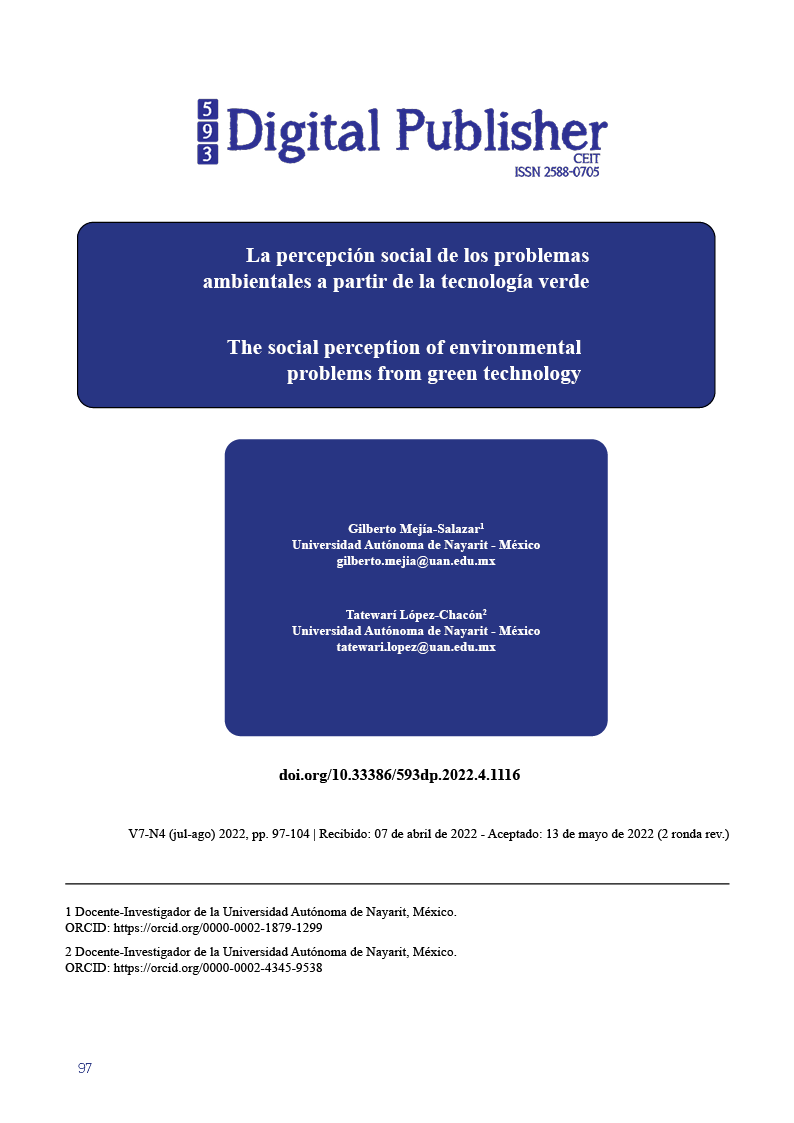The social perception of environmental problems from green technology
Main Article Content
Abstract
The research was developed with a quantitative approach, later, the main objective is to know and investigate the social perception about the knowledge of environmental problems from green technology. Deriving the following question: Do the environmental programs and problems that are consulted in the computer network create awareness in human beings about the conservation of our planet? Likewise, the participants were asked if they know the information that is published in the Internet on the separation and management of solid waste, 20.9% of the people answered that they know a lot about this topic, 69.8% of the people answered that little, and only 9.3% answered that they do not know anything about this theme. Similarly, green technology can counteract the current pollution of our planet, with 67.4% answering yes, while 32.6% answering no. Finally, green technology advances more and more for the benefit of human beings, who allow knowing the problems on the environment in a direct way in society, the technology will apply its function for the control of pollution, through the creation of proposals, protocols and strategies to counter it.
Downloads
Article Details

This work is licensed under a Creative Commons Attribution-NonCommercial-ShareAlike 4.0 International License.
1. Derechos de autor
Las obras que se publican en 593 Digital Publisher CEIT están sujetas a los siguientes términos:
1.1. 593 Digital Publisher CEIT, conserva los derechos patrimoniales (copyright) de las obras publicadas, favorece y permite la reutilización de las mismas bajo la licencia Licencia Creative Commons 4.0 de Reconocimiento-NoComercial-CompartirIgual 4.0, por lo cual se pueden copiar, usar, difundir, transmitir y exponer públicamente, siempre que:
1.1.a. Se cite la autoría y fuente original de su publicación (revista, editorial, URL).
1.1.b. No se usen para fines comerciales u onerosos.
1.1.c. Se mencione la existencia y especificaciones de esta licencia de uso.
References
tecnología para un desarrollo perdurable. Economía & Sociedad, 24(55), 92-112.
Cortés, F. J. (2019). Relaciones ciencia-sociedad en el ámbito de la epistemología ambiental. El principio de precaución y la duda moderna neocartesiana. Santiago: RIL editores, 112. pp.
Doonamis (2021). Cómo afecta la tecnología al medio ambiente: el lado positivo. www.doonamis.es. Recuperado de: https://www.doonamis.es/como-afecta-la-tecnologia-al-medio-ambiente-el-lado-positivo/ (Consultado 6 abril 2022).
Gil, H. A.; Cisneros, J. M.; Dante de Prada, J.; Plevich, J. O.; Sánchez, A. R. (2013). Tecnologías verdes para el aprovechamiento de aguas residuales urbanas: análisis económico. Ambiente & Agua-An Interdisciplinary Journal of Applied Science, 8(3), 118-128.
Johnson, M. (2011). Cómo las TIC pueden ayudar a enfrentar el cambio climático. Newsletter eLAC, núm. 14, 2-12.
Osegueda, C. F.; Hernández-Vázquez, M. A.; Cáliz-Saravia, H. G.; Escobar-Hernández, M. C.; Flores-Ramírez, D. C.; López-Echevarría, J. L.; Molina-Hidalgo, K. S; Palacios-Mejía, W. A.; Rodríguez-Hidalgo, L. N.; Sánchez-Menjivar, J. I.; Trejo-Matinez, L. N. (2019). Aportes de la ciencia y tecnología para el mejoramiento del medio ambiente en El Salvador. Revista entorno, núm. 68, 120-133.
Otzen, T. y Manterola, C. (2017). Técnicas de muestreo sobre una población a estudio. Int. J. Morphol., 35(1), 227-232.
Parra, A. y Cadena, Z. (2010). El medio ambiente desde las relaciones de ciencia, tecnología y sociedad: un panorama general. Revista CS, núm. 6, 331-359.
Peñaloza, M.; Arévalo, F. y Daza, R. (2009). Impacto de la gestión tecnológica en el medio ambiente. Revista de Ciencias Sociales, 15(2). Recuperado de: http://ve.scielo.org/scielo.php?script=sci_arttext&pid=S1315-95182009000200010 (Consulta 6 de abril 2022).
Pino, P. (2011). Las tecnologías de hoy en un mundo globalizado. Revista Gestión y Desarrollo, 8(1), 210-2016.
Porcelli, A. M. y Martínez, A. N. (s.f.). Las nuevas tecnologías de la informática a la luz de la Encíclica Laudato Si. Reflexiones sobre sus ventajas y desventajas. Modernas tendencias en tecnologías verdes. Pensar en Derecho. Recuperado de: http://www.derecho.uba.ar/publicaciones/pensar-en-derecho/revistas/8/las-nuevas-tecnologias-de-la-informatica-a-la-luz-de-la-enciclica-laudato-si.pdf (Consulta 6 abril 2022).
Ramos, D. A. (s.f). Innovación en tecnología verde y las restricciones estructurales para su desarrollo en los países de periferia. Recuperado de: http://ru.iiec.unam.mx/5251/1/2-096-Ramos.pdf (Consulta 6 abril 2022).
Rodríguez, A. M.; Martínez, M..; Martínez, I.; Fundora, H.; Guzmán, T. (2011). Desarrollo tecnológico, impacto sobre el medio ambiente y la salud. Revista Cubana de higiene y epidemiología, 49(2), 308-319.
Sancho, J. L. (2003). Tecnologías para un desarrollo sostenible. Rev.R.Acad.Cienc.Exact.Fís.Nat. (Esp), 97(2), 303-318.
Trillo, J. A. (2011). Ciencia, tecnología y sociedad. Recuperado de: www.revistagpt.usach.cl. (Consultado 4 abril 2022).



